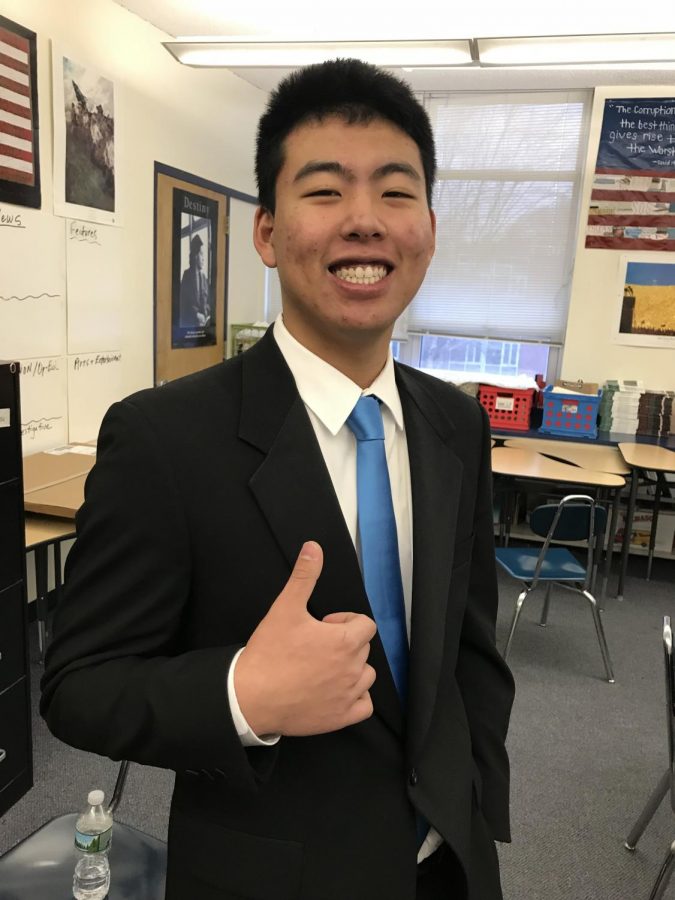DREAMing Big: Youta Adachi
May 31, 2018
America is a fast-changing and diverse nation. Contributing to this dynamic are hundreds of thousands of American high school students who are immigrants and members of the United States sponsored program Deferred Action for Childhood Arrivals, better known as DACA.
The DACA program was enacted by the Obama Administration in 2012. It gives minors who arrived in the US illegally as children a chance to receive a two-year renewable period that defers them from being deported, allowing them to apply for a work permit. These students are commonly referred to as “Dreamers.”
One of Scituate High School’s own, senior Youta Adachi, is a “Dreamer.” Adachi’s life has been filled with ups and downs; however, he uses his experiences to inspire his classmates and the community around him.
Adachi was born in Fukashima Hirano in Japan, which is located approximately four hours north of Tokyo. After the 2011 Tohoku earthquake and tsunami disaster, his family was devastated. “We were homeless for three weeks,” recounted Adachi. “We drove around in a car and stayed in crappy motels.” Eventually, the parents of Adachi’s American step-father flew the family out of Japan, which is how Adachi came to live in Scituate. Adachi was eleven-years-old when he relocated to the United States, and he could not speak English.
The transition to America was extremely difficult for Adachi. His family enrolled him in a private Catholic elementary school that promoted a strict academic environment. “It was hard,” recalled Adachi, “It didn’t give me any options.” Adachi said he didn’t understand the school’s culture, structure, or rules, which led him to feel isolated and excluded. Going from Buddhism to Catholicism was another difficult challenge for Adachi–a difference he still struggles with today.
After elementary school, Adachi transferred to Hull Memorial Middle School. Describing himself as the only “scrawny little Asian kid” in the school, Adachi said he became the victim of bullying and discrimination. “They were calling me dog eater,” he recalled. Looking back on the experience, Adachi commented, “I don’t blame them for not knowing better.” Adachi ended sixth grade with a disciplinary record that included several school suspensions for fighting.
In seventh grade, Adachi got a new start in Scituate. He worked with Vivienne Leonard, who was the SPS English as a Second Language (ESL) specialist at the time, to develop his English skills. His stepfather also encouraged him to read Dr. Seuss books to improve his English. Adachi spent the rest of his middle school years (as well as most of his high school years) attending Scituate Public Schools. Listening to American hip-hop music and watching popular TV shows–especially Chief Keef and South Park–inspired him to learn English.
Adachi credits his family members, teachers, and friends with helping him overcome the personal hardships he faced as a struggling teenager. After slipping into an unhealthy lifestyle, Adachi’s family gave him a wake-up call when they refused to overlook his destructive behaviors. Adachi said, “My grandma saw me and said, ‘What are you doing? You need to get help.’” Consequently, Adachi left Scituate to spend part of his sophomore and junior years living in Weymouth and Brockton, where he underwent treatment for addiction. Adachi said this was an extremely difficult experience; however, several people from Scituate kept in touch and lent him support. In particular, Gates Assistant Principal Ryan Beattie maintained communication with him through phone calls, texting, and FaceTime. When Adachi was eventually given the opportunity to return to Scituate during his senior year, he jumped at the chance. He is currently on track to graduate from Scituate High School in January of 2019.
According to Adachi, the DACA program is his lifeline. With representation from the Boston law firm Graves & Doyle, he is seeking permanent residency in the United States. After his case is heard in federal court, Adachi hopes to obtain a social security number and green card, which would permit him to work, obtain a driver’s license, and apply for financial aid in college. Admitting it will be a “weight off his shoulders” when the process is complete, Adachi has been seeking permanent residency for eight years.
Adachi dreams about graduating from high school and going to college to major in business. He would like to work for an American or Japanese company and use his bilingual skills. Adachi said his ideal job includes international travel to Japan. “If I could travel back and forth–that would be great,” he said.
Coping with the stress of his high school years, Adachi learned strategies to promote his personal wellness. Describing his daily routine of walking outside from 7:30 p.m. to 8:45 p.m. (without taking any technology), Adachi said maintaining a connection with nature has helped him exercise his imagination and stay healthy: “I’m not much of a hippie, but going outside helps me.”
In the future, Adachi would like to help other students who struggle with addiction or feelings of isolation and depression. In the fall, he hopes to work as a student intern at the middle school, where he feels he could make a difference for some students.
